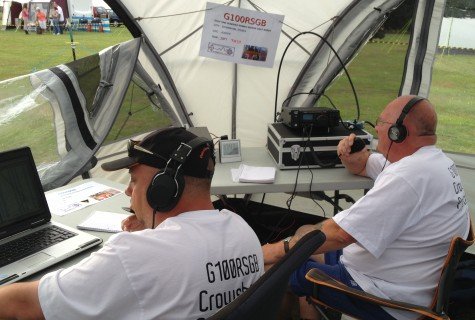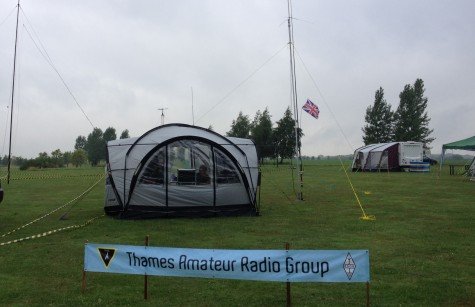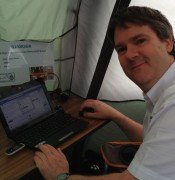As Essex amateurs will know, the G100RSGB callsign has been in our region in July and August 2013. So far, it’s been active in Essex with Braintree ARS, Chelmsford ARS, Colchester, the Essex CW Club, LEFARS and SEARS. The last Essex club to be handed the callsign was the Thames Amateur Radio Group, which started its two days of operation last Friday, the 9th of August.
The RSGB’s Centenary callsign started its final Essex stint at the Crowsheath Fishery, in the village of Downham near Billericay. The Thames ARG has operated from the site once before, in May this year. the low noise floor, distance from residential areas plus the local reservoir, made this the perfect operating spot, and with many of the club’s committee members fans of camping, this was the perfect place for a break and to operate G100RSGB.

The team racked up an impressive 680 or so contacts, with nine bands active over the 48 hour period. Operators and loggers included Mark M0IEO, Tom 2E0TNC, Mike M0MMB, Norman M0FZW, Dean M6BYF, Belinda M6JNX, Lucy M6UCY, Paul M0XLD, Sarah M6PSK, and Pete M0PSX. As well as SSB and FM voice, a PSK31 data station was active too.

Behind the scenes
QSO logging was looked after by Pete M0PSX:
“The two days have simply been great. It’s been a pleasure to be a part of the team working hard to give everyone the chance to work this sought-after callsign. Everyone on the team brought their own unique skills to the mix – organising the venue, erecting the antenna farm, sorting the power, putting up the gazebo, and keeping the team stocked up with tea.

“A mix of Logger32 and HRD was used to capture the QSOs, with logs backed-up, collated and sorted on-site. I also has access to the RSGB’s Alert service, allowing us to keep amateurs informed of where we were, announce upcoming changes, and even take a couple of requests for bands. When I wasn’t tied to the laptop, I had a couple of stints working the 40 metre pile-up, made a few local contacts on 2 metres, clocked up some PSK31 contacts and logged for all four stations. Poor signal from most of the mobile networks meant that data connectivity was poor, and with no access to mains, a mix of batteries and generators made it all possible.”
“It’s been a great two days of radio. We closed down the last two stations just before midnight on Saturday, handling over the G100RSGB callsign to the Darenth Valley Radio Society for their activation in Kent. Thanks to everyone involved with organising and staffing the event, to those that popped down to visit, and to the many stations that made contact with the TARG team.”
More details and a collection of photos can be found here: www.thamesarg.org.uk/g100rsgb
Related Links
- Thames Amateur Radio Group Club Profile
- Amateur Radio Clubs in Essex











